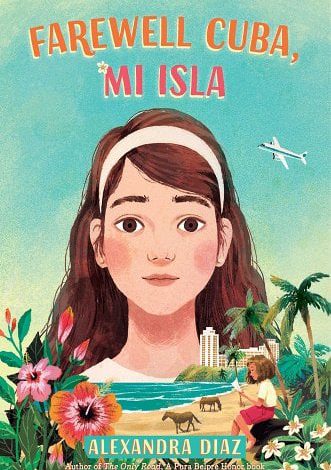Set in Cuba and the United Stated from 1958-1961, Farewell Cuba, Mi Isla by Alexandra Diaz was inspired by history. Many readers will recall the Cuban Missile Crisis and the Bay of Pigs, a time when Cubans fled from the tyranny of Fidel Castro, seeking refuge in Florida. While several of those refugees thought their home in the United States would be temporary, believing that the US would not allow a Communist country so close to their border, that belief did not come to pass.
Borrowing from memories of her own family’s stories, Diaz creates two tween cousins, Victoria Pino del Mar and Jacqueline Romero del Mar (aka Jackie) who live on their grandfather’s ranch in Cuba. When Castro takes control of Cuba, the wealthy, like Victoria’s family, fear for their safety and escape to the United States to escape the restrictions and oppressive politics. Not only resistant to the rumors but loyal to their country, Jackie’s family stays behind until Castro threatens to send children to work camps in Russia to be brainwashed. Because by this time, passports cannot be secured, Jackie’s family has to rely on Operation Peter Pan. Designed for children aged six to eighteen, this was a combined effort by the Catholic Welfare and Jewish Family and Children Services.
In the United States, the girls are targets of bullying, but together, they pool their resources, their work ethic, and their ingenuity. They are determined not only to find a passport forger but to generate the funds to pay for a passport for Jackie’s mother and baby brother, Clark.
At school, Victoria has home economics class with Miss Jiménez, an ally who assists Victoria with recipes and food. Here, Victoria also meets the silent Katya Volkova, a Russian refugee who has secrets of her own.
From the threads of Diaz’s plot, readers will learn many significant lessons, not only about how one person can indeed make a difference but also about the importance of making the present moment count. Furthermore, Miss Jiménez tells both Katya and Victoria: “My abuela always said a kitchen is where you come home. . . . It’s the place to heal and cry, grown and gain nourishment” (272).
- Posted by Donna

